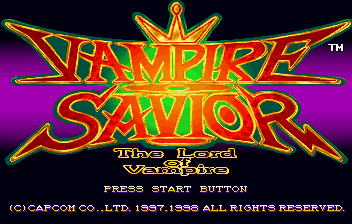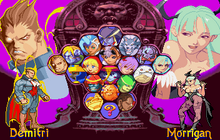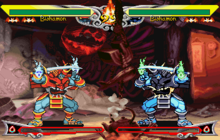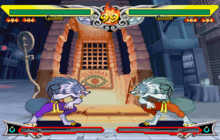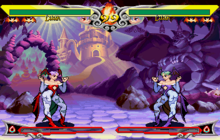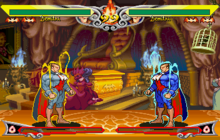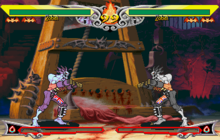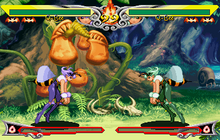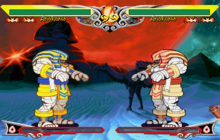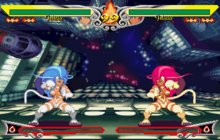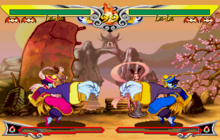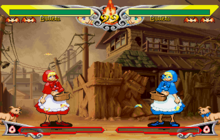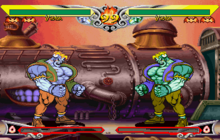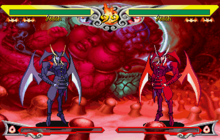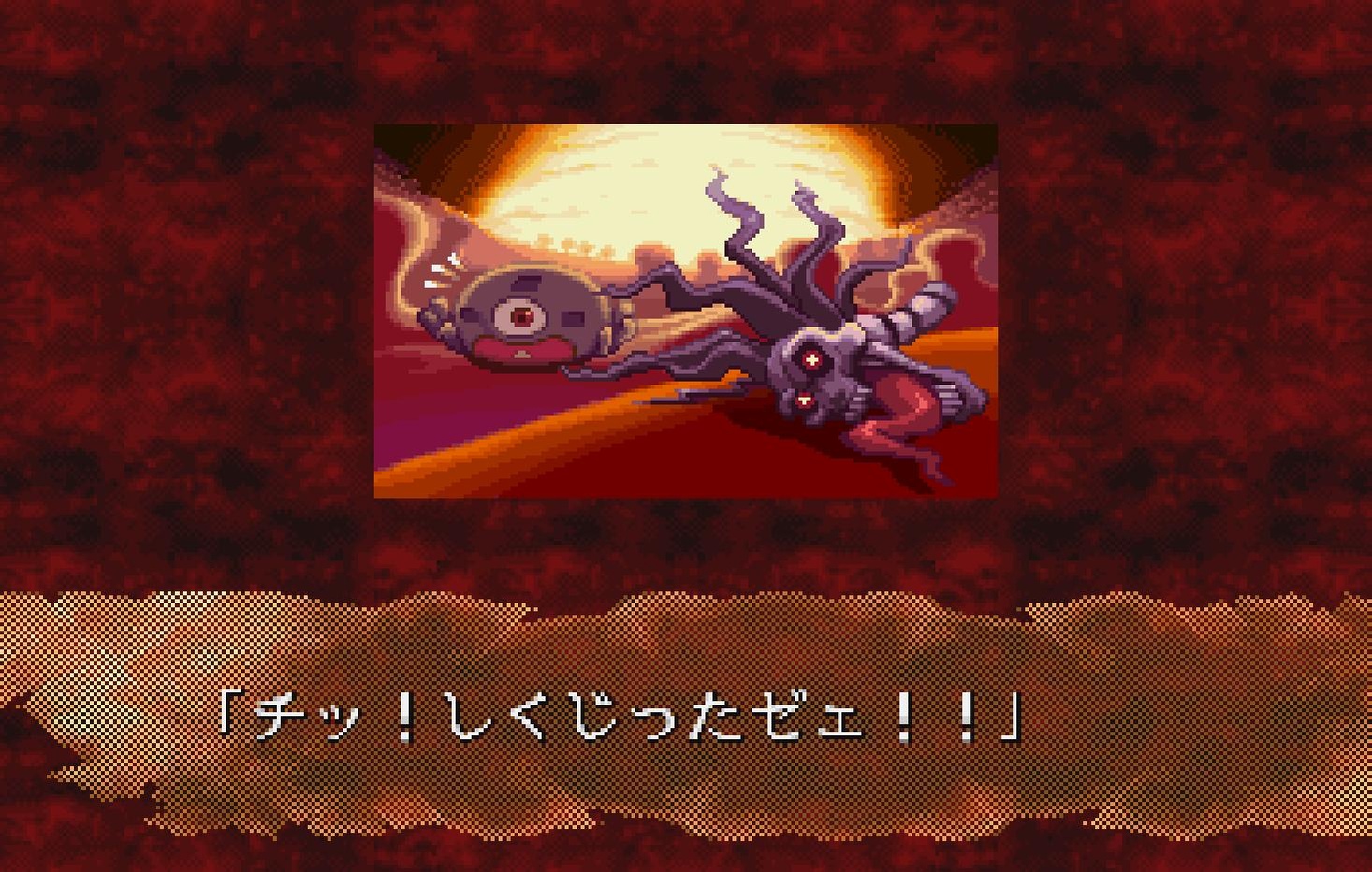Difference between revisions of "Vampire Savior: The Lord of Vampire"
From Sega Retro
| Line 35: | Line 35: | ||
==Gameplay== | ==Gameplay== | ||
{{ScreenThumb|Vampire Savior, Character Select.png|width=200|Character select}} | {{ScreenThumb|Vampire Savior, Character Select.png|width=200|Character select}} | ||
| − | The game is a fighting game similar to the preceding entries in the series. It introduces four new characters (Bulleta, Jedah, Lilith, and Q-Bee) and adds new moves or revises the existing characters. It replaces the traditional round system with a system similar to [[Rare]]'s ''Killer Instinct'': each fighter has two life bars and two corresponding life markers. When one fighter loses a life marker after the life bar is emptied, the fighters reset their positions as if starting a new round, but the victorious fighter retains their remaining life bar and the timer does not reset. When the player is attacked, some of the health lost is displayed in white, which can be recovered if the player does not take any more damage within a short duration. The game also introduces a new type of special ability called Dark Force moves. | + | The game is a fighting game similar to the preceding entries in the series. It introduces four new characters (Bulleta, Jedah, Lilith, and Q-Bee) and adds new moves or revises the existing characters. It replaces the traditional round system with a system similar to [[Rare]]'s ''Killer Instinct'': each fighter has two life bars and two corresponding life markers. When one fighter loses a life marker after the life bar is emptied, the fighters reset their positions as if starting a new round, but the victorious fighter retains their remaining life bar and the timer does not reset. When the player is attacked, some of the health lost is displayed in white, which can be recovered if the player does not take any more damage within a short duration (health does not recover while blocking). The game also introduces a new type of special ability called Dark Force moves. |
There is a single-player mode where the player chooses any character and fights six opponents before facing a final boss, which differs depending on the selected character. Each character also has a secret rival battle that can be played if the player does not lose a life marker and finishes at least three opponents with an EX or a Dark Force move before reaching the fifth opponent. A second player can challenge the first at any point by pressing {{Start}} on a second control pad, with the winner of the match moving on to the next opponent. There are eight different difficulty levels for the computer-controlled combatants. There is also a two-player versus mode where each player can choose any character, a handicap, and any stage. | There is a single-player mode where the player chooses any character and fights six opponents before facing a final boss, which differs depending on the selected character. Each character also has a secret rival battle that can be played if the player does not lose a life marker and finishes at least three opponents with an EX or a Dark Force move before reaching the fifth opponent. A second player can challenge the first at any point by pressing {{Start}} on a second control pad, with the winner of the match moving on to the next opponent. There are eight different difficulty levels for the computer-controlled combatants. There is also a two-player versus mode where each player can choose any character, a handicap, and any stage. | ||
| − | Characters move with {{left}} and {{right}} and dash with {{left}} {{left}} and {{right}} {{right}}. They jump upward with {{up}} and jump behind and ahead with {{upleft}} and {{upright}}. They crouch with {{down}}. Punches are done with {{X}} (light), {{Y}} (medium), and {{Z}} (hard) and kicks are done with {{A}} (light), {{B}} (medium), and {{C}} (hard). Light attacks are faster and hard attacks deal more damage. Chain combos can be performed by linking attacks from lightest to hardest and from punches to kicks, canceling the recovery of a normal move by starting another. Special moves for each character are done by pairing specific directional combinations with an attack button. Projectile attacks move slowly through each other, with the stronger projectile dissipating the other (depending on the strength of the attack button used and which was launched first) rather than canceling each other out as in most fighting games (unless they were launched at the same time with the same strength). ES moves are done by pressing the same directional combinations but holding two attack buttons of the same type (punches or kicks). Characters can perform a taunt with {{R}}, which is a short animation during which the character is vulnerable to attack. | + | Characters move with {{left}} and {{right}} and dash with {{left}} {{left}} and {{right}} {{right}}. They jump upward with {{up}} and jump behind and ahead with {{upleft}} and {{upright}}. They crouch with {{down}}. Punches are done with {{X}} (light), {{Y}} (medium), and {{Z}} (hard) and kicks are done with {{A}} (light), {{B}} (medium), and {{C}} (hard). Light attacks are faster and hard attacks deal more damage. Chain combos can be performed by linking attacks from lightest to hardest and from punches to kicks, canceling the recovery of a normal move by starting another. Special moves for each character are done by pairing specific directional combinations with an attack button. Projectile attacks move slowly through each other, with the stronger projectile dissipating the other (depending on the strength of the attack button used and which was launched first) rather than canceling each other out as in most fighting games (unless they were launched at the same time with the same strength). ES moves are done by pressing the same directional combinations but holding two attack buttons of the same type (punches or kicks). Characters can perform a taunt with {{R}}, which is a short animation during which the character is vulnerable to attack. |
| − | Throws and grabs are done by holding the D-Pad toward an opponent and pressing a medium or hard punch or kick button. Different characters have different throws available to them, and most characters can throw in midair. Characters can pursue knocked down opponents by holding {{up}} with the medium or hard kick button simultaneously. Knocked down characters can recover and leap away | + | Throws and grabs are done by holding the D-Pad toward an opponent and pressing a medium or hard punch or kick button. Different characters have different throws available to them, and most characters can throw in midair. Characters can pursue knocked down opponents by holding {{up}} with the medium or hard kick button simultaneously. Pursuit attacks only do recoverable (white) damage, so they must be followed up with additional attacks to do permanent damage. Knocked down characters can recover and leap away by holding {{left}} or {{right}} and pressing any attack button. |
| − | Guarding is done by holding the D-Pad away from the opponent | + | Guarding is done by holding the D-Pad away from the opponent. Characters can guard in midair but cannot air block against normal attacks from an opponent that is standing on the ground and cannot air block after performing an attack in the air. While guarding, pressing the punch and kick buttons rapidly has a chance of pushing the other character away. Characters can become dizzy from being attacked repeatedly; they are uncontrollable and vulnerable in this state but can recover more quickly by rapidly pressing back and forth on the D-Pad along with the attack buttons. It is also possible to escape grabs in this way. Most characters have one special move, called a guard cancel, that can be performed while guarding to cancel out of the block and immediately counterattack their opponent. |
| − | The game features a Special meter, which fills as characters perform regular and special moves. When it is full, characters can perform | + | The game features a Special meter, which fills as characters perform regular and special moves. When it is full, characters can perform three types of special moves: ES moves, EX moves, and Dark Force moves. ES moves ("enhanced special" moves) are enhanced versions of their special moves that can typically hit more times but sometimes differ drastically. EX moves ("extra special" moves) are unique special abilities that are usually more flashy and do more damage. Some characters can cancel chain combos into EX moves. New to the game are Dark Force moves, which use a level of the Super meter to perform a character-specific ability that temporarily boosts the character's damage, defense, or mobility for a limited period. Dark Force moves are performed by holding a punch and a kick button of the same strength or {{L}}. The Special meter can have multiple levels (with no limit), gaining a new level each time it fills, and using an ES, EX, or Dark Force move costs a level. The Special meter levels are retained between rounds but not battles. |
Players can choose between Normal and Turbo speed for battles. There are two playing styles that can be selected after choosing a character: Normal and Auto. The character automatically guards against a limited number of attacks in Auto mode and automatically performs chain combos when attacking with normal moves. | Players can choose between Normal and Turbo speed for battles. There are two playing styles that can be selected after choosing a character: Normal and Auto. The character automatically guards against a limited number of attacks in Auto mode and automatically performs chain combos when attacking with normal moves. | ||
| Line 123: | Line 123: | ||
}} | }} | ||
{{MoveListTable | desc=Dark Force | | {{MoveListTable | desc=Dark Force | | ||
| − | {{MoveListRow | Ocean Rage | Any {{punch}} and {{kick}} of the same strength | Aulbath calls forth a flood and rides on a sea creature. He can surf in any direction using the D-Pad or mount or dismount the creature by pressing all three {{kick}} simultaneously.}} | + | {{MoveListRow | Ocean Rage | Any {{punch}} and {{kick}} of the same strength | Aulbath calls forth a flood and rides on a sea creature. He can surf in any direction using the D-Pad or mount or dismount the creature by pressing all three {{kick}} simultaneously. He moves through hits while surfing.}} |
}} | }} | ||
}} | }} | ||
| Line 565: | Line 565: | ||
{{MoveListTable | desc=Dark Force | | {{MoveListTable | desc=Dark Force | | ||
{{MoveListRow | Great Geldenheim S | {{button|text=LP}}+{{button|text=LK}} or {{button|text=MP}}+{{button|text=MK}} | Victor is followed by the ghost of Professor Gerdenheim, which enhances his durability, speed, and throws.}} | {{MoveListRow | Great Geldenheim S | {{button|text=LP}}+{{button|text=LK}} or {{button|text=MP}}+{{button|text=MK}} | Victor is followed by the ghost of Professor Gerdenheim, which enhances his durability, speed, and throws.}} | ||
| − | {{MoveListRow | Great Geldenheim L | {{button|text=HP}}+{{button|text=HK}} | Victor is followed by the ghost of Professor Gerdenheim, which enhances his durability | + | {{MoveListRow | Great Geldenheim L | {{button|text=HP}}+{{button|text=HK}} | Victor is followed by the ghost of Professor Gerdenheim, which enhances his durability and speed and charges his medium and hard punches and kicks with electricity.}} |
}} | }} | ||
}} | }} | ||
Revision as of 12:24, 14 July 2023
| Vampire Savior: The Lord of Vampire | |||||||||||||||
|---|---|---|---|---|---|---|---|---|---|---|---|---|---|---|---|
| System(s): Sega Saturn | |||||||||||||||
| Publisher: Capcom | |||||||||||||||
| Developer: Capcom | |||||||||||||||
| Original system(s): Capcom CPS-2 | |||||||||||||||
| Sound driver: SCSP/CD-DA (18 tracks) | |||||||||||||||
| Peripherals supported: Extended RAM Cartridge (4MB only) | |||||||||||||||
| Genre: Fighting/Taisen Kakutou (対戦格闘)[1], Action[2] | |||||||||||||||
| Number of players: 1-2 | |||||||||||||||
| |||||||||||||||
|
Vampire Savior: The Lord of Vampire (ヴァンパイア セイヴァー) is a versus fighting game by Capcom which was later brought to the Sega Saturn in Japan. It is the sequel to Vampire Hunter and the third release in the Darkstalkers franchise.
The game was at one point set for release in North America as DarkStalkers 3: Vampire Savior[4], but this version did not materialise.
Contents
Story
Jedah Dohma, one of the high nobles of Makai, is resurrected after a premature death long ago. Seeing the current chaotic state of the demon world, he decides that the only way to save Makai is to recreate it. To this end, he conjures a pocket dimension known as Majigen, to which he summons worthy souls to help feed his new world.
Gameplay
The game is a fighting game similar to the preceding entries in the series. It introduces four new characters (Bulleta, Jedah, Lilith, and Q-Bee) and adds new moves or revises the existing characters. It replaces the traditional round system with a system similar to Rare's Killer Instinct: each fighter has two life bars and two corresponding life markers. When one fighter loses a life marker after the life bar is emptied, the fighters reset their positions as if starting a new round, but the victorious fighter retains their remaining life bar and the timer does not reset. When the player is attacked, some of the health lost is displayed in white, which can be recovered if the player does not take any more damage within a short duration (health does not recover while blocking). The game also introduces a new type of special ability called Dark Force moves.
There is a single-player mode where the player chooses any character and fights six opponents before facing a final boss, which differs depending on the selected character. Each character also has a secret rival battle that can be played if the player does not lose a life marker and finishes at least three opponents with an EX or a Dark Force move before reaching the fifth opponent. A second player can challenge the first at any point by pressing START on a second control pad, with the winner of the match moving on to the next opponent. There are eight different difficulty levels for the computer-controlled combatants. There is also a two-player versus mode where each player can choose any character, a handicap, and any stage.
Characters move with ![]() and
and ![]() and dash with
and dash with ![]()
![]() and
and ![]()
![]() . They jump upward with
. They jump upward with ![]() and jump behind and ahead with
and jump behind and ahead with ![]() and
and ![]() . They crouch with
. They crouch with ![]() . Punches are done with
. Punches are done with ![]() (light),
(light), ![]() (medium), and
(medium), and ![]() (hard) and kicks are done with
(hard) and kicks are done with ![]() (light),
(light), ![]() (medium), and
(medium), and ![]() (hard). Light attacks are faster and hard attacks deal more damage. Chain combos can be performed by linking attacks from lightest to hardest and from punches to kicks, canceling the recovery of a normal move by starting another. Special moves for each character are done by pairing specific directional combinations with an attack button. Projectile attacks move slowly through each other, with the stronger projectile dissipating the other (depending on the strength of the attack button used and which was launched first) rather than canceling each other out as in most fighting games (unless they were launched at the same time with the same strength). ES moves are done by pressing the same directional combinations but holding two attack buttons of the same type (punches or kicks). Characters can perform a taunt with
(hard). Light attacks are faster and hard attacks deal more damage. Chain combos can be performed by linking attacks from lightest to hardest and from punches to kicks, canceling the recovery of a normal move by starting another. Special moves for each character are done by pairing specific directional combinations with an attack button. Projectile attacks move slowly through each other, with the stronger projectile dissipating the other (depending on the strength of the attack button used and which was launched first) rather than canceling each other out as in most fighting games (unless they were launched at the same time with the same strength). ES moves are done by pressing the same directional combinations but holding two attack buttons of the same type (punches or kicks). Characters can perform a taunt with ![]() , which is a short animation during which the character is vulnerable to attack.
, which is a short animation during which the character is vulnerable to attack.
Throws and grabs are done by holding the D-Pad toward an opponent and pressing a medium or hard punch or kick button. Different characters have different throws available to them, and most characters can throw in midair. Characters can pursue knocked down opponents by holding ![]() with the medium or hard kick button simultaneously. Pursuit attacks only do recoverable (white) damage, so they must be followed up with additional attacks to do permanent damage. Knocked down characters can recover and leap away by holding
with the medium or hard kick button simultaneously. Pursuit attacks only do recoverable (white) damage, so they must be followed up with additional attacks to do permanent damage. Knocked down characters can recover and leap away by holding ![]() or
or ![]() and pressing any attack button.
and pressing any attack button.
Guarding is done by holding the D-Pad away from the opponent. Characters can guard in midair but cannot air block against normal attacks from an opponent that is standing on the ground and cannot air block after performing an attack in the air. While guarding, pressing the punch and kick buttons rapidly has a chance of pushing the other character away. Characters can become dizzy from being attacked repeatedly; they are uncontrollable and vulnerable in this state but can recover more quickly by rapidly pressing back and forth on the D-Pad along with the attack buttons. It is also possible to escape grabs in this way. Most characters have one special move, called a guard cancel, that can be performed while guarding to cancel out of the block and immediately counterattack their opponent.
The game features a Special meter, which fills as characters perform regular and special moves. When it is full, characters can perform three types of special moves: ES moves, EX moves, and Dark Force moves. ES moves ("enhanced special" moves) are enhanced versions of their special moves that can typically hit more times but sometimes differ drastically. EX moves ("extra special" moves) are unique special abilities that are usually more flashy and do more damage. Some characters can cancel chain combos into EX moves. New to the game are Dark Force moves, which use a level of the Super meter to perform a character-specific ability that temporarily boosts the character's damage, defense, or mobility for a limited period. Dark Force moves are performed by holding a punch and a kick button of the same strength or ![]() . The Special meter can have multiple levels (with no limit), gaining a new level each time it fills, and using an ES, EX, or Dark Force move costs a level. The Special meter levels are retained between rounds but not battles.
. The Special meter can have multiple levels (with no limit), gaining a new level each time it fills, and using an ES, EX, or Dark Force move costs a level. The Special meter levels are retained between rounds but not battles.
Players can choose between Normal and Turbo speed for battles. There are two playing styles that can be selected after choosing a character: Normal and Auto. The character automatically guards against a limited number of attacks in Auto mode and automatically performs chain combos when attacking with normal moves.
Characters
Move lists assume the player is facing right. If facing left, ![]() and
and ![]() should be reversed. P refers to any of the punch buttons, while K refers to any of the kick buttons.
should be reversed. P refers to any of the punch buttons, while K refers to any of the kick buttons.
All special moves can be performed as ES moves if two P or K buttons are used instead of one, with the exception of teleports.
Bulleta, Jedah, Lilith, and Q-Bee are new characters. Donovan, Phobos, and Pyron were absent in the original arcade release, but they are present in the Saturn version.
Players can choose from eight different color schemes for each character: six corresponding to the six attack buttons, plus two additional color schemes available by selecting the character with two P buttons or two K buttons simultaneously.
Stages
Characters have particular stages where their matches are hosted in the single-player mode. Some characters share a stage, and some characters use multiple stages. The stage can be manually chosen in the two-player mode. Every stage has an alternate color scheme.
In the two-player mode, the alternate color scheme can be chosen by holding ![]() while selecting the stage, or the stage can be randomized by holding
while selecting the stage, or the stage can be randomized by holding ![]() .
.
History
Legacy
Aside from re-releases, this game has been the last entry in the Darkstalkers series (though characters from the series would continue to appear in crossover games such as Marvel vs. Capcom: Clash of Super Heroes and Capcom vs. SNK: Millennium Fight 2000).
The game was included in the Darkstalkers series compilation release Vampire: Darkstalkers Collection for the PlayStation 2 in 2005. It was remastered as part of Darkstalkers Resurrection for the PlayStation 3 and Xbox 360 in 2013. It was re-released as part of the Capcom Fighting Collection compilation for the PlayStation 4, Xbox One, Nintendo Switch, and Windows PCs in 2022.
Production credits
- Main Music Composer: Anarchy Takapon (Takayuki Iwai)
- Sub Music Composer: Cyber-T (Tetsuya Shibata), Masato Kouda (Cipher)
- Sound Effect & Voice Edit: MOE.T (Cipher)
- Sound Driver: Yasushi Ikeda "A!Ohana"
- Sound Tool: Tomohiro Masuda (Q~CVE)
- Sound "Q_64M" Hardware: IDA~~~~~~~N
- Character Design: Eripyonsuke, Makoto Ishii, Fujihara, ARI, Takemoto, Rumi Chan, Takayuki Kosaka, Reiko_Komatsu, Masarusan-N, Kuri, Tanuki, Kitasan, Ball Boy, Mizuho, Q, WHO, Kimo Kimo, N_Labo, You.Ten.Nakano, Mizupyon, Kaname, Tsuyoshi, Fuzii & Peliko, G.Kamina, Yoshioka, IsI.B GAO, Hitoshi Igarashi, Kozuchi
- Scroll Design: Kyotani, Yumiko Nakatsuka, Tamachan, Chie Morisaki, Goro Suzuki 1996, Kanno, Yuugen, Pokkemon
- Program Design: Hyper Shinchan, Cham, PON, MiN, Ittetsu, 24 (Nishi), Moto & Tomo Nogi, T.Hirokado, Hard.Yas - Jedah -
- Planner: S.Obata, Neo_G -H. Ishizawa-, Malachie, Nohah, Kanetaka (Kinta)
- Voice Actor: Kae Araki, Yuji Ueda, Hiroko Konishi, Isshin Chiba, Kan Tokumaru, Yayoi Jinguji, Michiko Neya, Nobuyuki Hiyama, Miyuki Matsushita, Yoshizumi Kozue, Jyurouta Kosugi, Kyoko Hikami
- Special Thanks: Haruo Murata, Takuya Shiraiwa, Erik Suzuki, Shoei, Sakomizu, Hiroaki "X68K" Kondo (Cipher), MOE.K (Momora)
- Producer: Tetsuya Iijima
- General Producer: Noritaka Funamizu, Yoshiki Okamoto, And Capcom All Staff
- Sound Adviser: Anarchy Takapon (Takayuki Iwai), Takeshi Kitamura (MOE.T), Hiroshi Ohno
- Programmer: Masashi Kitamura, Takahiro Ichiba, Takashi Endo, Misa Hashimoto, Hiroko Matsubara, Takahiro Matsuo, Haruhiko Shimizu
- Director: Kenshi Kimura
- Development Manager: S-Hama
- Producer: Hyper Mickey
- ...And
- Presented by: Capcom
Magazine articles
- Main article: Vampire Savior: The Lord of Vampire/Magazine articles.
Promotional material
Physical scans
| Sega Retro Average | |||||||||||||||||||||||||||||||||||||||||||||||||||||||||||||||||||||||||||||||||||||||||
|---|---|---|---|---|---|---|---|---|---|---|---|---|---|---|---|---|---|---|---|---|---|---|---|---|---|---|---|---|---|---|---|---|---|---|---|---|---|---|---|---|---|---|---|---|---|---|---|---|---|---|---|---|---|---|---|---|---|---|---|---|---|---|---|---|---|---|---|---|---|---|---|---|---|---|---|---|---|---|---|---|---|---|---|---|---|---|---|---|---|
|
| 87 | |
|---|---|
| Based on 17 reviews | |
Technical information
- Main article: Vampire Savior: The Lord of Vampire/Technical information.
References
- ↑ File:VampireSavior Saturn JP Box Back.jpg
- ↑ 2.0 2.1 https://sega.jp/history/hard/segasaturn/software_l.html#tab04 (Wayback Machine: 2019-12-07 02:59)
- ↑ 3.0 3.1 3.2 Sega Saturn Magazine, "1998-11 (1998-04-10,17)" (JP; 1998-03-27), page 2
- ↑ File:E31997 Capcom PressKit.pdf, page 15
- ↑ File:VampireS Saturn JP SSEnding.pdf
- ↑ Ação Games, "Julho 1998" (BR; 1998-xx-xx), page 40
- ↑ Consoles +, "Juin 1998" (FR; 1998-0x-xx), page 124
- ↑ Computer & Video Games, "June 1998" (UK; 1998-05-13), page 66
- ↑ Edge, "June 1998" (UK; 1998-05-21), page 89
- ↑ Famitsu, "1998-04-24" (JP; 1998-04-10), page 1
- ↑ Gamers' Republic, "June 1998" (US; 1998-05-xx), page 86
- ↑ MAN!AC, "06/98" (DE; 1998-05-06), page 60
- ↑ Mega Console, "Giugno 1998" (IT; 1998-xx-xx), page 74
- ↑ Mega Fun, "07/98" (DE; 1998-06-03), page 94
- ↑ neXt Level, "Juli 1998" (DE; 1998-06-19), page 76
- ↑ Saturn Fan, "1998 No. 8" (JP; 1998-04-10), page 163
- ↑ Saturn Fan, "1998 No. 11" (JP; 1998-05-29), page 70
- ↑ Sega Magazin, "Juli 1998" (DE; 1998-06-03), page 12
- ↑ Sega Saturn Magazine, "June 1998" (UK; 1998-05-xx), page 66
- ↑ Sega Saturn Magazine, "1998-12 (1998-04-24)" (JP; 1998-04-10), page 192
- ↑ Sega Saturn Magazine, "Readers rating final data" (JP; 2000-03), page 10
- ↑ Video Games, "6/98" (DE; 1998-05-27), page 94
| Vampire Savior: The Lord of Vampire | |
|---|---|
|
Main page | Comparisons | Hidden content | Magazine articles | Reception | Technical information
Demos: Vampire Savior: The Lord of Vampire Taikenban (1998) | |
| Darkstalkers/Vampire games for Sega systems | |
|---|---|
| Night Warriors: Darkstalkers' Revenge (1996) | Vampire Savior: The Lord of Vampire (1998) | Vampire Chronicle for Matching Service (2000) | |
| Related games | |
| Super Puzzle Fighter II Turbo (1996) | Pocket Fighter (1998) | |
